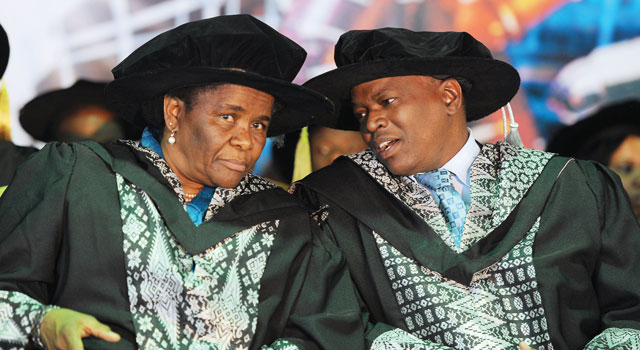George Kgoroba
2000-2004
Kgoroba, a former school teacher and lecturer took over the reigns of the Education Ministry from Ponatshego Kedikilwe. Kedikilwe took over the ministerial position after the 1999 general elections but resigned after just seven months. He had quite big shoes to fill as he had taken over from one of the most celebrated female educators in Botswana, Dr Gaositwe Chiepe.
Chiepe was already said to have been “instrumental in developing Botswana’s education system and is known to many as the woman who fought for free education in Botswana.”
Kedikilwe was one of Mogae’s trusted colonels and he had chaired the National Commission on Education in 1993, which recommended major education policy adjustments from 1994. Therefore his appointment to the education portfolio was seen as appropriate and was also seen as a better replacement for Chiepe.
But Kedikilwe’s letter of resignation may suggest that the education ministry was too hot to handle then as it is now.
“I have had occasion to assess the breadth and depth of the education portfolio and came to the conclusion that I cannot measure up to the job, particularly as my concentration is distracted by political and personal considerations,” wrote Kedikilwe.
This left Mogae with no option but to reshuffle cabinet and bring to education one of his other trusted soldiers, late George Kgoroba.
He came in at the time United Nations Organization for Education, Science and Culture (UNESCO) was focusing on “Quality education for all: rights and costs”.
To meet these ideals, Botswana increased her expenditure on education to about 30% of the National Budget, according to UNESCO recommendations. Kgoroba came at a time when government saw the need to invest more in education.
Jacob Nkate
2004-2009
At the time Nkate took over the Ministry of Education he was also entangled in the Botswana Democratic Party’s (BDP) internal political battles. He was a leading contender for the position of Vice President, and this could have affected his ministerial performance as many believed he was the most dismal performing minister.
Nkate’s main priority was to “improve” the tertiary sector. He even came up with the Draft Tertiary Education Policy and presented it to Parliament for approval in 2009. At that time Nkate pointed out that his ministry spent between 18 and 20 per cent of its recurrent budget on tertiary education.
It was because of Nkate’s presentation to Parliament that government to took the decision to sponsor students to local private tertiary institutions versus external placement. Nkate also influenced the establishment of more public tertiary institutions.
Nkate might have put most of his effort on tertiary education while leaving behind primary and secondary education. When he was busy with the tertiary sector the overall education performance plummeted.
Mokgweetsi Masisi
2014-2015
Mokgweetsi Masisi was seen as Moitoi’s ‘savior’ when he was appointed to the ministry as acting minister after the most recent educational crises. Masisi came with the right credentials for the job having been an English and History teacher. He also served at Curriculum Development and Evaluation and worked as Social Studies Curriculum Specialist. Masisi also worked at UNICEF in 1995 as Education Project Officer.
However, he had a short stint in education and could not rescue the sinking ship before being relieved his duties after ascending to the position of Vice President.
Unity Dow
2015
Dow, a former High court judge took over from Masisi this month. She was initially his assistant minister . Dow had an unsuccessful bid at the 2014 general elections in Mochudi West under the ruling Botswana Democratic Party banner.
Her tenacious judicial traits will have to help her survive in this troubled ministry. Dow has an uphill task to resuscitate the ministry whose performance has been plummeting for the last 15 years, according to experts.

